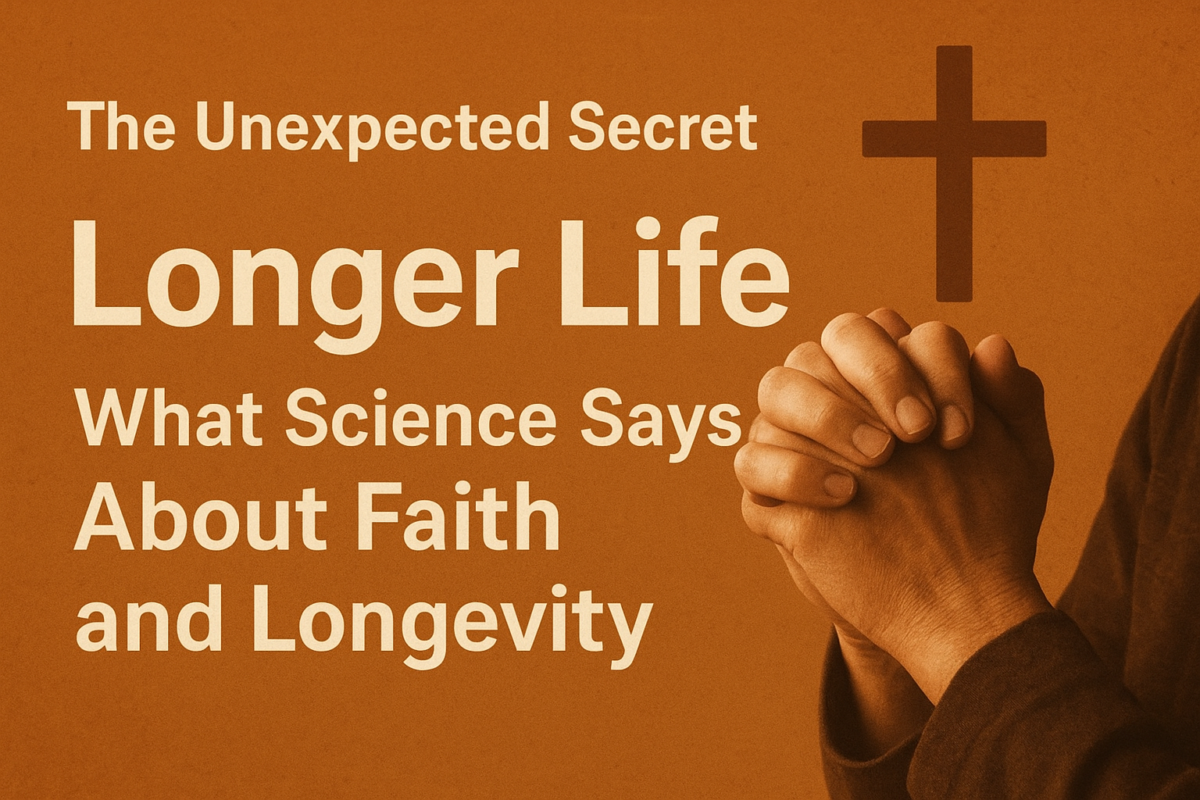It is one of the most striking and consistent findings in social epidemiology: people who are religious or regularly attend religious services tend to live longer, healthier lives [1] [2].
For many, this correlation is surprising. While faith is often associated with spiritual and emotional well-being, the data suggests a tangible, physical benefit that can add years to a person’s life. Studies have shown that individuals with religious affiliations may live, on average, between four and ten years longer than their non-religious counterparts [3]. Furthermore, frequent attendance at religious services has been linked to a significantly lower risk of all-cause mortality [4].The question, then, is not if this link exists, but why. The answer, as researchers have found, lies less in the theological and more in the powerful, non-theological benefits that religious practice provides. By understanding these mechanisms, non-religious individuals can effectively “hack” the system and incorporate these life-extending benefits into their own secular lives.
Unpacking the “Why”: Three Pillars of Longevity
The scientific consensus points to three primary, interconnected factors that mediate the relationship between religiosity and a longer lifespan. These are the actionable lessons that can be universally applied.
The Power of Community and Social Support
Perhaps the most significant factor is the robust social network provided by religious communities. Regular attendance at services, meetings, and group activities combats one of the most serious threats to modern health: social isolation
The community provides a built-in social network that offers a ready-made, multi-generational support system, which is crucial for reducing feelings of loneliness. This social support acts as a powerful buffer against life’s stressors, which in turn can lower chronic inflammation and cortisol levels.
Furthermore, religious communities often provide practical assistance to members, such as childcare, meals during illness, or financial support, which significantly reduces overall life strain. Finally, the community fosters accountability and a sense of belonging and mutual responsibility, encouraging members to show up and participate.The Lesson: Cultivate a Consistent, High-Quality Community. The benefit comes from regular, in-person engagement with a stable group of people who share a common purpose.
2. Healthier Lifestyle and Behavior
Many religious traditions promote behaviors that are inherently protective of health. These practices often serve as a powerful form of social control, discouraging risky or unhealthy habits.•Reduced Substance Abuse: Many faiths explicitly prohibit or strongly discourage the use of tobacco, excessive alcohol, and illicit drugs. This directly reduces the risk of numerous chronic diseases and accidental death
[7].•Dietary Practices: Some religions encourage healthier eating patterns, such as vegetarianism, fasting, or adherence to specific dietary laws, which can lead to better metabolic health.
Lower Risk-Taking: A framework of moral and ethical guidelines often leads to lower rates of high-risk behaviors, including reckless driving or promiscuity, which further reduces mortality risk.
The Lesson: Adopt a Value-Driven, Restrictive Lifestyle. The benefit is not the restriction itself, but the discipline and avoidance of harmful habits that result from a commitment to a higher standard.
3. Psychological Well-being and Coping Mechanisms
Religious belief systems offer powerful psychological resources that help individuals navigate the inevitable challenges of life, reducing the mental and physical toll of stress.
Sense of Purpose and Meaning: Faith often provides a clear framework for life’s meaning, which is strongly associated with reduced mortality risk
[4]. This sense of purpose can motivate individuals to care for their health and plan for the future.
Coping Strategies: Prayer, meditation, and a belief in a benevolent higher power provide a structured way to cope with grief, illness, and tragedy. This “religious coping” can reduce anxiety and depression [8].
Hope and Optimism: A belief in an afterlife or a divine plan can foster a sense of hope and optimism, which are psychological traits linked to better cardiovascular health and immune function.
The Lesson: Develop a Robust, Non-Theological Meaning System
The benefit is the psychological resilience that comes from having a transcendent framework for understanding suffering and a structured practice for managing stress.
How Non-Religious People Can Incorporate These Lessons
The good news is that the longevity benefits of religiosity are largely transferable. You do not need to adopt a faith to gain the advantages of community, discipline, and purpose.Here is a practical guide for the non-religious to integrate these life-extending principles:
1. Consistent Community (The “Third Place” & Intentional Social Connection):
The religious mechanism of a Consistent Community can be replaced by finding a “Third Place” and making an Intentional Social Connection. To do this, join a regular, in-person group (e.g., a book club, a sports league, a volunteer organization, or a local political action group). The key is to commit to attending at least once a week to build the same kind of stable, supportive network that religious services provide.
2. Healthy Lifestyle (Secular Asceticism & Habit Stacking):The Healthy Lifestyle promoted by faith can be achieved through Secular Asceticism and Habit Stacking. Adopt a strict, non-religious commitment to a healthy habit (e.g., “I will not drink alcohol on weekdays,” or “I will run three times a week”). The goal is to find an accountability partner or system to maintain the discipline and avoidance of harmful habits that results from a commitment to a higher standard.
3. Sense of Purpose (The “Transcendent Project” & Existential Framework):The Sense of Purpose found in religion can be fulfilled by dedicating yourself to a “Transcendent Project” and developing an Existential Framework. This means dedicating yourself to a cause larger than yourself (e.g., environmentalism, mentorship, scientific research). Define your personal mission statement and review it weekly to gain the psychological resilience that comes from having a transcendent framework for understanding suffering.
4. Coping Mechanisms (Mindfulness and Philosophical Practice):The structured Coping Mechanisms of faith can be substituted with Mindfulness and Philosophical Practice. Adopt a structured, daily practice like secular meditation, Stoicism, or journaling. Use these tools to reframe negative events and reduce stress, thereby gaining the psychological benefits of structured stress management [9].
By intentionally building these structures—a consistent community, a disciplined lifestyle, and a transcendent purpose—non-religious individuals can tap into the same powerful mechanisms that contribute to the remarkable longevity observed in religious populations. The secret to a longer life is not necessarily faith, but the healthy, structured life that faith often inspires.
References
[1] People with Religious Affiliations Live Longer, Study Shows (AAU) – Study found religious people lived nearly four years longer.
[2] Tyler VanderWeele: Do Religious People Live Longer? (Harvard) – Notes strong associations between attending religious services and living a long time.
[3] Why Do People of Faith Live Longer? (APU) – Cited a study showing those with religious affiliations lived an average of 9.45 and 5.64 years longer respectively.
[4] Attending religious services linked to longer lives, study shows (Harvard Health) – Linked frequent service attendance to fewer deaths over 16 years among women.
[5] The Importance of Connections: Ways to Live a Longer, Healthier Life (Harvard T.H. Chan School of Public Health) – Highlights social connection as a key factor in longevity.
[6] Pathways from religion to health: Mediation by psychosocial… (APA PsycNet) – Suggests religious engagement operates through social support to decrease mortality.
[7] The Mental Health Benefits of Religion & Spirituality (NAMI) – Notes that religiosity reduces suicide rates, alcoholism, and drug use.
[8] Religion, Spirituality, and Health: The Research and Clinical… (PMC) – Discusses how religion provides resources for coping with stress.
[9] How to find new spiritual practices (Psyche) – Suggests a wide range of disciplines and rituals outside of religion that can serve to advance personal well-being.
[10] The link between spirituality and longevity (PMC) – A narrative review exploring the evidence of a relationship between spirituality/religiosity and longevity.

